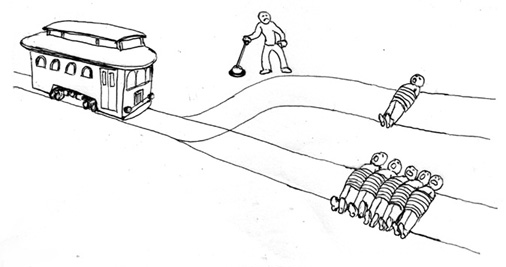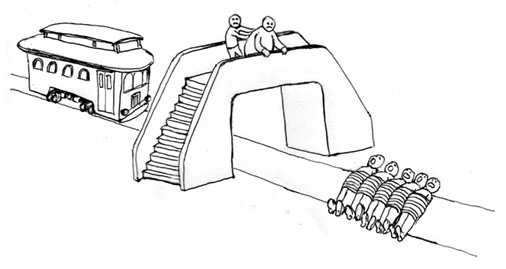Decision Making and Diversity
The Folly of Value Alignment
CFI Lunchtime Seminar
Justice: What’s The Right Thing to Do?

Sandel (2010)
The Trolley Problem

Utility Theory and Utilitarianism
- Utilitarianism maps to utility theory
- Assume that result of a decision can be evaluated mathematically.
Utility Theory
- An approach to balancing sensitivity vs specificity in a decision.
- Decision theory
Basics
- define a utility function
The Push and the Trolley

Prospect Theory
- Daniel Kahneman’s Nobel Memorial Prize in Economics was awarded for the idea of prospect theory.
- Kahneman describes the theory and its background in his book, “Thinking Fast and Slow” (Kahneman, 2011).
- Empirical theory about how people are responsive to change in circumstance, not absolute circumstance.
Subjective Utility
- Bentham’s ideas focussed around the idea of a global utility.
- Natural selection insists there must be variation in the population
- Without variation, there is no separation between effective and ineffective strategies.
A Cognitive Bias towards Variance
- Kahneman explores our tendency to produce overcomplicated explanations
- Prediction is \[ \text{model} + \text{data} \rightarrow \text{prediction}\]
- Models fail as overly simple or overly complex
Bias vs Variance
- ‘bias variance dilemma’ Geman et al. (1992)
- Decompose errors as
- due to oversimplification (the bias error) and
- those due to insufficient data to underpin a complex model (variance error).
In Machine Learning











Decision Making and Bias-Variance
- In a population we should prefer variance-errors.
- Bias errors lead to consistent, decsion making.
- Consistently wrong!
- Variance errors can also be averaged e.g. bagging (Breiman, 1996)
Rational Behaviour
- Sustain a variety of approaches to life.
- Complex explanations such as half-time football punditry.
- Also clinical experts (Meehl, 1954). Meehl suggested they ‘try to be clever and think outside the box’.
{So the observations that humans “over complicate” whether it’s in football punditry or as Meehl (1954) observes in clinical prediction, is associated with
One Correct Solution
- Artificial Selection and Eugenics.
- OK for race horses, greyhounds, crops, sheep and cows
- Not OK for the humans.
One Correct Solution
- Flawed understanding of science
- Animals in a species become too specialised then they may not be
able to respond to changing circumstances.
- Think of cheetahs and eagles vs rats and pigeons.
Similar Ideas Socially
I may not agree with many people’s subjective approach to life, I may even believe it to be severely sub-optimal. But I should not presume to know better, even if prior experience shows that my own ‘way of being’ is effective.
Variation is vitally important for robustness. There may be future circumstances where my approaches fail utterly, and other ways of being are better.
A Universal Utility
- Quality of our individual subjective utilities measured by effectiveness.
- But it is survival of entire species that dominates long term.
- A universal utility by which we are judged is difficult to define.
The Real Ethical Dilemma
- Trolley Problem is an oversimplification.
- Driverless cars:
- introduce driverless cars and bring about a 90% reduction in deaths
- What if remaining deaths are all cyclists?
Artificial vs Natural Systems
- Consider natural intelligence, or natural systems
- Contrast between an artificial system and an natural system.
- The key difference between the two is that artificial systems are designed whereas natural systems are evolved.
Natural Systems are Evolved
Survival of the fittest
?
Natural Systems are Evolved
Survival of the fittest
Herbet Spencer, 1864
Natural Systems are Evolved
Non-survival of the non-fit
Mistake we Make
- Equate fitness for objective function.
- Assume static environment and known objective.
Uncertainty and Absolutism
Absolute Policies
- There is only one absolute policy we should follow.
There will be no single absolute policy that should be followed slavishly in all circumstances
Some Models are Useful
All models are wrong, but some are useful
Since all models are wrong the scientist must be alert to what is importantly wrong. It is inappropriate to be concerned about mice when there are tigers abroad.
George E. P. Box (Box, 1976)
Tigers and Trolleys
- The second example is largely contrived, and riddled with uncertainty.
Uncertainty: The Tyger that Burns Bright
Tyter Tyger, burning bright, In the forests of the night; What immortal hand or eye, Could frame thy fearful symmetry?
First verse of The Tyger by William Blake, 1794
Conclusion
- Uncertainty of the correct utility implies ‘correct’ decision is difficult produce or verify.
- Tendency to seek proxies such as consistency in decision making.
- Consistent algorithms oversimplifies.
- Society would be more robust if diversity of solutions and opinions are sustained and respected.
Thanks!
book: The Atomic Human
twitter: @lawrennd
podcast: The Talking Machines
newspaper: Guardian Profile Page
blog posts:
Links
- Articles in the Guardian are available from my Guardian Profile Page
- My blog has articles relating to this area.
- This post on System Zero and This post on the Mechanistic Fallacy relate to the ideas in this talk.
- This post on natural vs artificial systems
- This paper on decision making and diversity